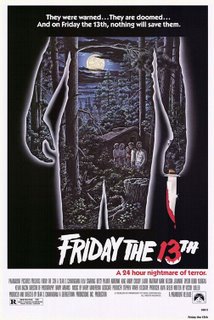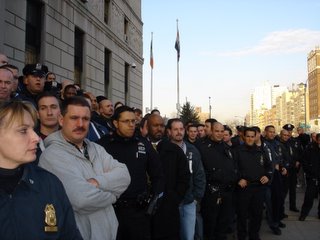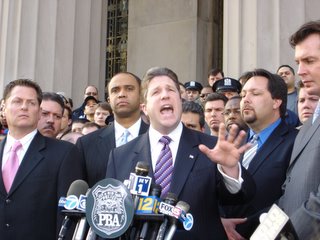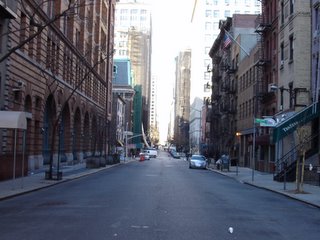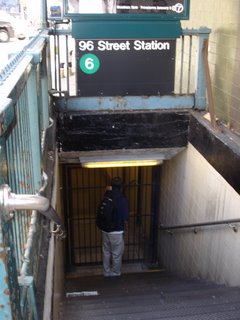cop killers or political prisoners?
 Prisoner Herman Bell, left, in an undated photograph. A former Black Panther and member of the Black Liberation Army, Bell was convicted in the 1971 murders of two NYPD officers. He goes before a parole board next month -- for the second time.
Prisoner Herman Bell, left, in an undated photograph. A former Black Panther and member of the Black Liberation Army, Bell was convicted in the 1971 murders of two NYPD officers. He goes before a parole board next month -- for the second time.NEW YORK
Herman Bell, one of three men convicted in the shooting deaths of two NYPD officers 35 years ago, could soon again be smelling the roses.
But Diane Piagentini, whose 28-year-old husband Joseph died alongside his partner, Officer Waverly Jones, 33, as they responded to what was supposed to be a routine sick call on May 21, 1971, wants to stop Bell from ever getting that chance.
"These men have not shown any remorse for what they have done, they still consider themselves political prisoners," Piagentini said. "Every two years, the families have to deal with this. We relive what happened in 1971."
Bell, Anthony Bottom, and Albert Washington were convicted in April 1975, nearly four years after the officers were shot a total of 17 times while responding to a routine call at the Colonial Park Houses in Washington Heights. Patrick Murphy, the NYPD’s commissioner at the time, dubbed them “madmen” and said the shootings were “deliberate, unprovoked and maniacal.”
The men, who became known as the “New York 3” for their alleged memberships to the Black Panther Party and Black Liberation Army, were convicted to 25 years to life.
Bell is slated to make his second appearance before a three-member parole board sometime in mid-February. He was denied parole in February 2004. Bottom, who was denied parole in July 2002 and July 2004, will return again in July, according to Carol Weaver, spokeswoman for the state’s Division of Parole. (Washington died of liver cancer in prison in April 2000.)
Prior to her appearance today before the state Division of Parole, where she will read a Victim’s Impact statement, Piagentini will hold a news conference in front of its office on West 31st Street.
“Under no circumstances should they ever be considered for parole,” according to Piagentini’s prepared remarks, which she read to me on the telephone a day before the hearing.
She continued, “From now until the end of time, they should be denied and spend the rest of their lives in jail.”
After every overnight shift, Officer Piagentini would return from the 32nd Precinct and share a cup of coffee with his wife, recapping his tour.
“As we talked about the job, he said that Waverly always had his back and he had Waverly’s,” Piagentini said. “And I said to him, ‘Then I guess when you’re with Waverly, you will both be safe.”
-----
According to a Web site maintained by the Prison Activist Resource Center, Bell, who published a statement in July 1997, looked forward to being paroled so he could fish with his mother. But Bell never got that chance -- she died two earlier.
“She and I had made big plans for when I got out, going fishing at the reservoir was at the top of our list,” Bell wrote. “It was a longstanding deal between us. From childhood, I acquired her love of flowers, especially for red roses. Hers were exceptionally pretty and fragrant, and she would remark: Not bad for a country girl. She had no direct hand in shaping my politics, but her strength of character, gentle spirit, wisdom and easy laughter had much to do with making me the person I am today; and I miss her so.”
Efia Nwangaza, co-chair of The Jericho Movement, a group founded in 1998 that represents political prisoners, believes it is politics -- and not the murder of two officers -- that has kept Bell and Bottom behind bars for more than three decades.
“They should be granted parole,” she said. “They are political prisoners who were charged and tried and convicted for their political activities -- and they continue to be held because of their political beliefs.”
In a statement issued last year, when both men went before parole boards, Police Commissioner Raymond Kelly said they should remain behind bars. Through a spokesman yesterday, Kelly said those remarks still stand.
“I was at work as a New York City police officer on the night [Jones and Waverly] were assassinated,” it read. “I remember vividly how word of the attacks spread through the ranks.”
Patrick Lynch, president of the Patrolmen’s Benevolent Association, who will stand beside Piagentini today, said Bell should never get the chance to smell his favored red roses again.
“We look forward to the day that a person convicted of killing a police officer is given the death penalty or is incarcerated without the possibility of parole,” Lynch said in a statement. “Herman Bell, in an act so despicable and inhuman that it defies description, took the wounded police officer Piagentini’s service revolver from his holster and continued shooting the officer even as he pleaded for mercy . . . These cold blooded assassins and domestic terrorists should remain in jail for the rest of their lives.”
